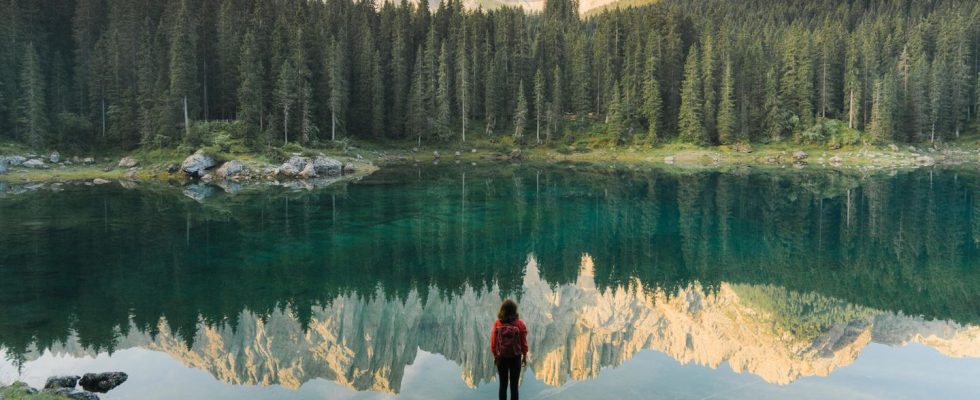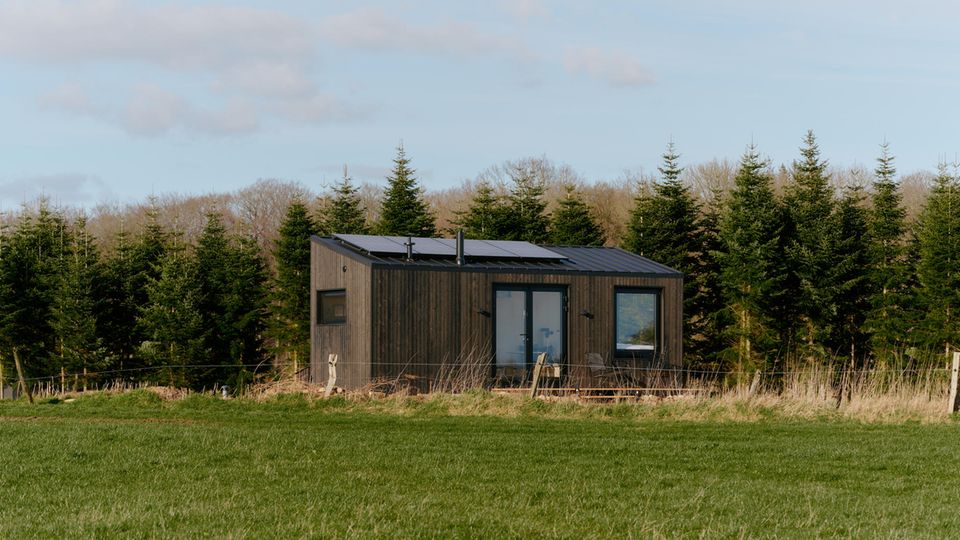Julian Trautwein felt like many others during the pandemic – he just wanted to get out. Get out of the big city, out of the hamster wheel. So he and two friends started building small cabins in the middle of nature. A conversation about the longing for peace and the future of nature holidays.
You send big city dwellers into nature with your company – to be more precise, into special cabins that are in the middle of nowhere, far away from the hustle and bustle of the big city. Camping has been around for a long time, so what’s new about your idea?
Julian Trautwein: For me, our cabins are the perfect mix of nature and comfort. When you go camping, you usually have little comfort and extensive preparation. If you sleep in the hotel, there is often a lack of peace, so you end up standing in line with other guests in the buffet line and don’t really get much from nature. With us you get the best of both worlds.
Sounds a bit like glamping…
Not necessarily. Our cabins are solar powered and have a water tank with a filter system. That means each guest has a limited resource for their stay. Something that we no longer know from the city. But this can be incredibly grounding and evoke a new mindfulness. So we try to bring high comfort to nature in a minimally invasive way. It’s not that easy from a technical point of view.
Deliberately bored in nature
How exactly does it all work?
In order to be able to operate our locations decentrally, we have installed a lot of technology in the background. For example, we have many elements from the smart home area. We can remotely measure the temperature and humidity as well as the battery and water levels of each cabin and open the doors with an AI. This helps us with maintenance and ultimately serves to enable the guest to have their offline experience. So we are building a digital infrastructure so that visitors can enjoy the forest or the stars comfortably and undisturbed. Access for the common city dweller should be as easy and stress-free as possible. That means we look at the radius of one to two hours around large cities and look for possible parking spaces for our huts there.
What are the people who book into one of your cabins looking for?
Our guests come mainly to do nothing or just to be bored. They don’t come to go sightseeing, but to finally finish their book or to lounge on the couch all day. Our accommodations are also geared towards this. There are no large screens, but instead a large window with a view of nature – so to speak, the basic Netflix with nature documentary in real time.
How did it come about that three city dwellers create a real oasis of peace?
The three of us founded our company called “Raus”. Christopher, Johann and I have known each other for more than 20 years, we grew up together in Hamburg. After school we all started our careers in very different industries. And then we all had key moments around the same time that made us start a business together.
The longing for a place of refuge
What were those moments?
For example, Christopher is actually a banker. During Corona, he quit his job from one day to the next because he no longer felt comfortable in the industry and instead started growing tomato beds in his garden. Johann was working in the political bubble at the time and was more or less on the verge of burnout. His wife then dragged him into a tiny house where he slept through the night for two days. I worked in a company that digitizes long-distance travel. There were major challenges due to Corona, we were all on short-time work. And then my first son was born. That was a reason for me to also deal with our general travel behavior and the effects.
The huts of Julian Trautwein and his co-founders are now at 40 locations in Germany – always in the middle of nature.
© StayRaus GmbH
And then?
I think each of us has noticed in our own way that although our life in the city is really exciting, we all find it extremely difficult to really switch off. So we needed a sanctuary for ourselves. So, very intrinsically motivated, we thought about what that could look like. And since we all liked to spend time in nature, but didn’t have the opportunity to do it in a contemporary way, the idea for Raus came about.
So the whole thing was originally a private operation?
Exactly. We then built two cabins and offered them for rent on a website in order to finance them. That was in winter in Brandenburg. After two weeks we were fully booked. This showed us that many people are looking for such a refuge.
How do you explain this unexpected success?
None of us are trained architects or hoteliers. We designed and planned it all from the guest perspective. In hindsight, maybe that was a bit naïve. But we simply asked ourselves how we would find such an experience great and what we need for it. From this, the sketch of the first cabin was created.
More understanding for a different living environment
You have now built more than 40 cabins across Germany. How do you actually get the land?
Our partners are mainly agricultural businesses that provide us with part of the unused land. You benefit economically from renting out the space and at the same time you can bring our guests a little closer to life with various offers if they wish. For example, they can also use us to sell products and products from their farm shops to guests, or offer activities such as alpaca hikes or farm visits.
An aspect that you like to emphasize. Why?
Because people can see what it actually takes to get a carrot to end up in our city supermarket, there may be a little more understanding for the other way of life. A small contribution to closing the gap between town and country.


